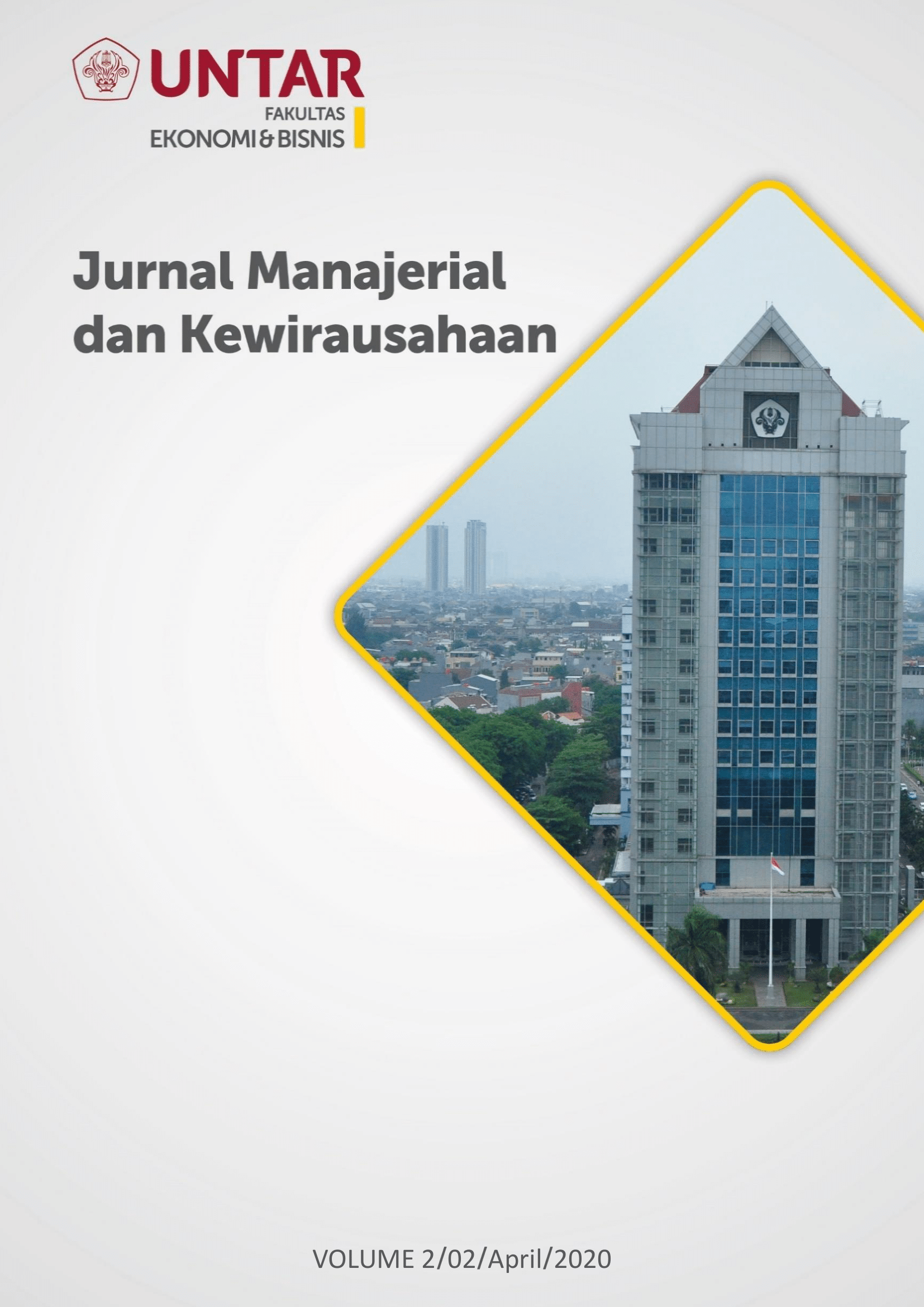Pengaruh Intellectual Capital Terhadap Kinerja Perusahaan
Main Article Content
Abstract
The purpose of this study is to analyze the effect of human capital, structural capital, and human capital on firm performance of retail trade companies listed on the Indonesia Stock Exchange in the 2014-2018 period. This study uses a sample selection technique in the form of purposive sampling. The sample in study were 18 samples in total. This study uses a descriptive research design with a quantitative approach. The results showed that structural capital and relational capital do not have a significant influence on ROA and negatively affect ROA. Meanwhile, human capital has a positive and significant influence on ROA.
Tujuan penelitian ini adalah untuk menganalisis pengaruh human capital, structural capital, dan human capital terhadap kinerja perusahaan pada perusahaan retail trade yang terdaftar di Bursa Efek Indonesia periode 2014-2018. Penelitian ini menggunakan teknik pemilihan sampel berupa purposive sampling. Sampel dalam penelitian ini berjumlah 18 sampel. Penelitian ini menggunakan desain penelitian deskriptif dengan pendekatan kuantitatif. Hasil penelitian menunjukkan bahwa structural capital dan relational capital tidak memiliki pengaruh signifikan terhadap ROA serta berpengaruh negatif terhadap ROA. Sedangkan, human capital memiliki pengaruh positif dan signifikan terhadap ROA.
Article Details
This work is licensed under a Jurnal Muara Ilmu Ekonomi dan Bisnis Creative Commons Attribution-ShareAlike 4.0 International License.,/p>
References
Angesti, Y. G., & Santioso, L. (2019). Faktor-Faktor Yang Mempengaruhi Volatilitas Harga Saham Perusahaan Manufaktur. Jurnal Ekonomi, 24(1), 46–64. https://doi.org/10.24912/je.v24i1.450
Audreylia, J., & Ekadjaja, A. (2014). Pengaruh Modal Intelektual Terhadap Kinerja Perusahaan Perbankan Dengan Ukuran Perusahaan Sebagai Variabel Kontrol. Jurnal Akuntansi, XVIII(10), 286–301.
Davis, P. J., & Simpson, E. (2017). Resource-Based Theory, Competition and Staff Differentiation in Africa: Leveraging Employees as A Source of Sustained Competitive Advantage. American Journal of Management, 17(1), 19. Retrieved from https://0-search-proquestcom.oasis.unisa.ac.za/docview/1926898178/fulltextPDF/869675928C0B4469PQ/52?accountid=14648&ticket=ST-6016181-Lun7T1QJay7v62PbWbwa7MXMIns-lmkncastc03pv
Hamdan, A. (2018). Intellectual capital and firm performance: Differentiating between accounting-based and market-based performance. International Journal of Islamic and Middle Eastern Finance and Management, 11(1), 139–151. https://doi.org/10.1108/IMEFM-02-2017-0053
Kanchana, N., & Mohan, P. R. R. R. (2017). a Review of Empirical Studies in Intellectual Capital and Firm Performance. Indian Journal of Commerce & Management Studies, VIII(1), 52–58. https://doi.org/10.18843/ijcms/v8i1/08
Khan, M. T., Humayun, A. A., & Sajjad, M. (2015). Connotation of “Human Capital: Concept, Effects and Benefits (Review) Origin of Concept of Human Capital. International Journal of Information, Business and Management, 7(1), 19–36.
Kumar, S., Colombage, S., & Rao, P. (2017). Research on capital structure determinants: a review and future directions. International Journal of Managerial Finance, 13(2), 106– 132. https://doi.org/10.1108/IJMF-09-2014-0135
Lalovi?, G., & Koman, M. (2018). Do Better Performing Companies Possess More Intangible Assets: Case of Slovenia. Economic and Business Review, 20(1), 5–50. https://doi.org/10.15458/85451.59
Lestari, D., & Wicaksono, B. W. (2018). Kinerja Perusahaan Ditinjau Dari Faktor Non Keuangan Dan Struktur Modal. Jurnal Ekonomi, 23(3), 389. https://doi.org/10.24912/je.v23i3.420
Mantari, J. S., & Nuryasman, M. (2017). Moderation Effect of Exchange Rate to Signaling Theory Validity in Indonesia Stock Exchange. Business and Management Studies, 3(1), 80. https://doi.org/10.11114/bms.v3i1.2259
Min, Z., Zhenggang, C., & Jing, L. (2018). Stakeholder Theory Based on Information Field Model. Advances in Management & Applied Economics, 8(3), 11–26.
Mohammad, H. S., & Bujang, I. (2019). Performance of Malaysian Financial Firms: An Intellectual Capital Perspective Using MVAIC Model. Asian Economic and Financial Review, 9(7), 752–765. https://doi.org/10.18488/journal.aefr.2019.97.752.765
Mohammed, S. A. S. A. N., & Muhammed, J. (2017). The relationship between agency theory, stakeholder theory and Shariah supervisory board in Islamic banking: An attempt towards discussion. Humanomics, 33(1), 75–83. https://doi.org/10.1108/H-08-2016-0062
Nuryasman, M. (2001). Peningkatan Kualitas Sumber Daya Manusia Melalui Problem-Based Learning (PBL) Problem-Based Learning Sebagai Salah Satu Sarana Peningkatan Kualitas Sumber Daya Manusia. Jurnal Manajemen, 5(2), 89–97.
Puspitaningtyas, Z. (2019). Empirical evidence of market reactions based on signaling theory in Indonesia Stock Exchange. Investment Management and Financial Innovations, 16(2), 66–77. https://doi.org/10.21511/imfi.16(2).2019.06
Rehman, W. U., Ahmad, A., Bashir, F., & Azeem, S. (2017). Intellectual Capital Driven Performance: Role of Innovative Performance and Business Process. Pakistan Economic and Social Review, 55(1), 223–246.
Safriliana, R., Subroto, B., Subekti, I., & Fuad Rahman, A. (2019). Overviewed of Contracting Theory & Agency Theory: Determinants Public Accounting Firms Switching on Voluntary. International Journal of Organizational Innovation, 11(3), 10–21. https://doi.org/10.18502/kss.v3i10.3381
Susanto, L. (2017). Intellectual Capital and Firm Performance. International Journal of Economic Perspectives, 11(1), 1621–1631.
Tondi, T., Samosir, B., & Hatane, E. (2015). Pengaruh Human Capital Efficiency, Relational Capital Efficiency, Capital Employed Efficiency, Dan Situasi Krisis Ekonomi Global Terhadap Non Performing Loans, Perusahaan Perbankan Di Indonesia Tahun 2007-2015. Business Accounting Review, 5(2), 49–62.



